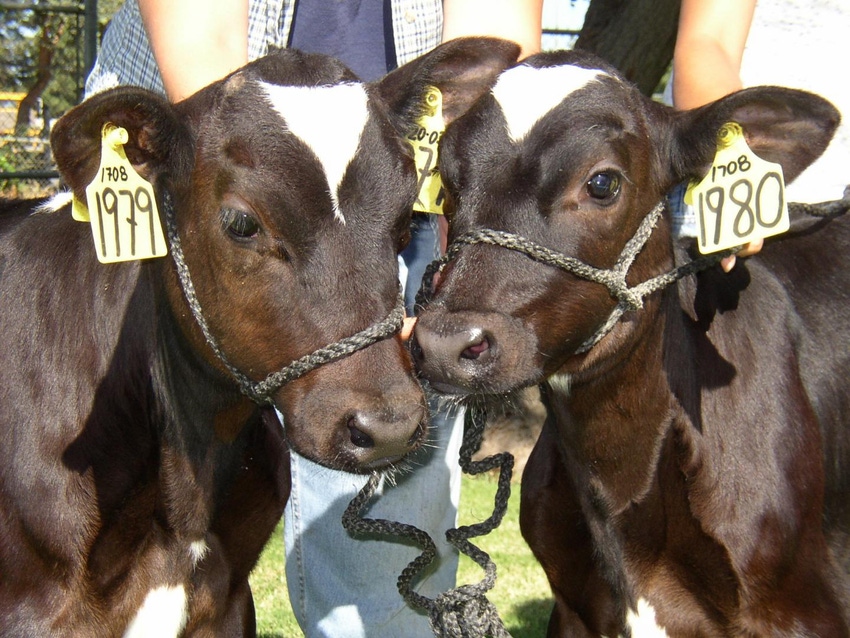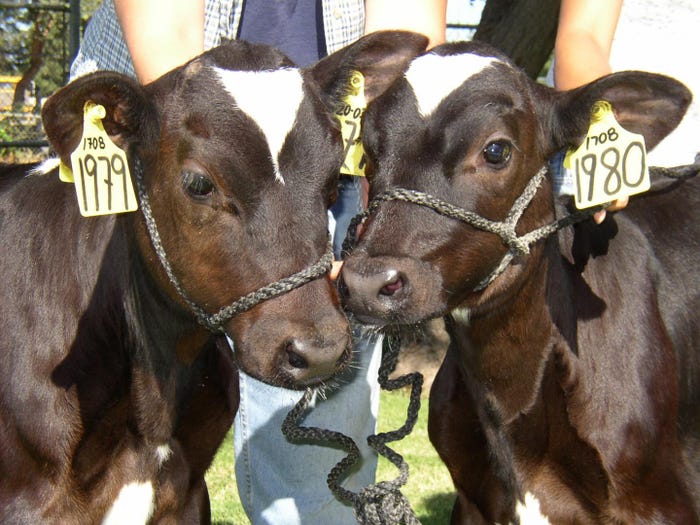Gene expression pinpoints multiple anomalies that likely to lead to pregnancy failure for clones.
December 12, 2016

It has been 20 years since Dolly the sheep was successfully cloned in Scotland, but cloning mammals remains a challenge. Researchers from the U.S. and France conducted a new study of gene expression in developing clones that shows why most cloned embryos likely fail.
Dolly was cloned using the "somatic cell nuclear transfer" technique in which a nucleus from an adult cell is transferred into an unfertilized egg that has had its nucleus removed and is then shocked with electricity to start cell growth. Embryos are next transferred to recipient mothers, who carry the clones to birth.

Dot and Ditto, two healthy cloned calves born at the University of California-Davis in 2003. While Dot and Ditto were healthy and went on to have calves of their own, many cloned embryos fail. A new study shows that many genes are abnormally regulated in cloned embryos, especially in extra embryonic tissue and the placenta. Credit: Alison Van Eenennaam, UC-Davis Department of Animal Science.
Cloning cattle is an agriculturally important technology and can be used to study mammalian development, but the success rate remains low, with typically fewer than 10% of the cloned animals surviving to birth, according to an announcement from the University of California-Davis (UC-Davis). The majority of losses are due to embryonic death, a failure during the implantation process or the development of a defective placenta.
Gene expression in clones
In a study published Dec. 8 in the journal Proceedings of the National Academy of Sciences, Harris Lewin, professor in the UC-Davis department of evolution and ecology, and colleagues in France and the U.S. used RNA sequencing to look at gene expression in cloned cows during implantation in order to get a better understanding of the molecular mechanisms that lead to a high rate of pregnancy failure for clones. The study is the culmination of 12 years of collaboration and combines the French team's expertise in cloning and reproductive biology with the U.S. team's expertise in functional genomics.
"Our work tackled fundamental questions relating to the cloning process," Lewin said. "The study has resulted in the redefinition of our understanding of how nuclear reprogramming affects gene expression in extra-embryonic tissues of cloned cattle embryos and the exquisite communication between clones and their recipient mothers."
"The large amount of data our collaboration has generated sheds light on mechanisms that account for embryonic losses at implantation," said Olivier Sandra, team leader for the study at the Institut National de la Recherche Agronomique in France. "They also provide new insights on how events taking place at implantation drive the progression of pregnancy and shape the postnatal phenotype of the progeny — in cattle as well as in other mammalian species."
The researchers studied tissue from cloned cow embryos — all derived from the same cell line — at 18 days and 34 days of development, as well as the corresponding endometrial lining of the pregnant cows. They also looked at non-cloned cows conceived using artificial insemination.
Using RNA sequencing, the researchers found multiple genes whose abnormal expression could lead to the high rate of death for cloned embryos, including failure to implant in the uterus and failure to develop a normal placenta. Looking at the extra-embryonic tissue of the cloned cows at day 18, the researchers found anomalies in the expression of more than 5,000 genes.
Lessons from mouse genome
When they compared the results to the Mouse Genomic Informatics Knockout database, the researchers found 123 genes that corresponded with functional annotation of abnormal extra-embryonic tissue morphology, 121 associated with embryonic lethality and 14 with abnormal embryo implantation.
By day 34 of development, however, the pattern of gene expression was much more similar to control cows derived from artificial insemination, suggesting that these surviving clones were able to implant in the uterus and begin to form a placenta. These results indicate that the large losses of clones before implantation probably result from problems with critical developmental genes in the extra-embryonic tissue.
The study also revealed other points of potential failure for the clones, including problems with hormonal signaling between the developing cloned embryo and the pregnant cow. For example, the study found down-regulation of genes involved in interferon tau, the major signal of pregnancy recognition. The clones also appeared to have an effect on the gene expression of the pregnant cows themselves: On day 34, some uterus tissue showed grossly different gene expression, which could affect the placenta, the researchers said.
"Our data confirm that the interactions between the uterus and the extra-embryonic tissues are critical during implantation, making this step a major hurdle for the progression of pregnancy," Sandra said.
"We now understand why clones fail, which can lead to improvements in the process of cloning of animals," Lewin added. However, "Our discoveries also reinforce the need for a strict ban on human cloning for any purposes."
"It's amazing that the process works at all, demonstrating the great plasticity that developing animals have to adapt to extreme conditions," Lewin said.
You May Also Like

.png?width=300&auto=webp&quality=80&disable=upscale)

